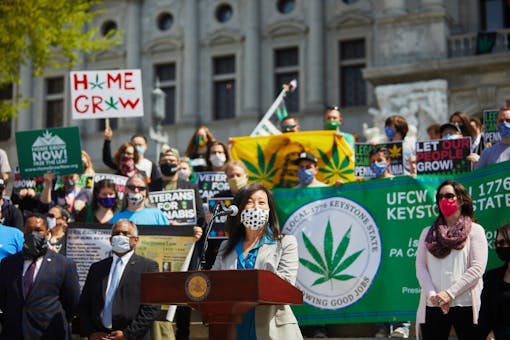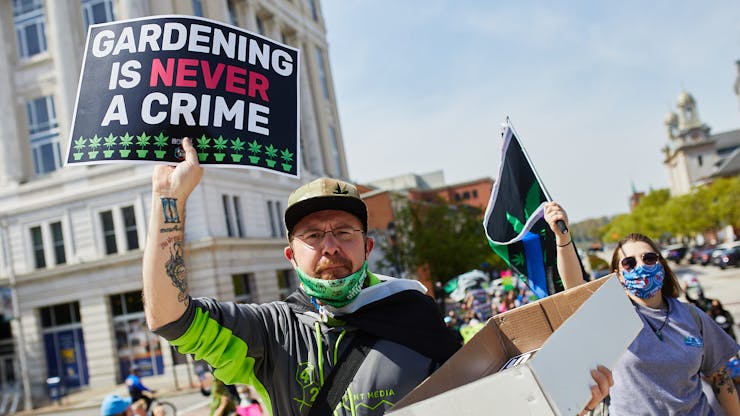HARRISBURG, PA—A raucous crowd of advocates marked this 4/20 by urging Pennsylvania state legislators to legalize cannabis and stop arresting 20,000 people for marijuana possession every year in the Keystone State.
“Nobody deserves to be a criminal for a plant!” Jeff Riedy, Executive Director of the Lehigh Valley NORML chapter, proclaimed to a cheering crowd gathered on the steps of the state capitol in Harrisburg. “Gardening is never a crime.”

Jobs and tax money going out of state
With the state’s neighbors to the north and east—New York and New Jersey—expected to open adult-use cannabis stores in the coming year, Pennsylvania stands to lose tens of thousands of jobs and hundreds of millions of dollars in tax revenue until in-state residents are allowed to grow, sell, and purchase legally.
Legalization could mean 33,000 jobs and $500 million in annual tax revenue for Pennsylvania.
According to new data released yesterday by Leafly, a fully legal Pennsylvania market could see $2.3-$3.3 billion in revenue within three to five years of opening. That translates into roughly $500 million in annual tax revenue, and support for between 32,800-47,100 legal cannabis jobs. If that market existed today, Pennsylvania would be America’s third largest cannabis industry, behind only California and Colorado.

Pennsylvania shut out of USA’s fastest-growing industry
“This is the fastest growing American industry, and Pennsylvania deserves to benefit from this massive opportunity,” said Leafly CEO Yoko Miyashita, who spoke to the crowd yesterday.
Meanwhile, Pennsylvania police continue to arrest more than 20,000 state residents on marijuana charges every year. That’s a waste of human potential that comes at an annual cost of $75 million in police and court budgets.

Voters want it, legislators aren’t so keen
Legalization should be a no-brainer here, and it would be, if put to voters in a statewide initiative. Polls indicate that nearly two-thirds of local voters favor adult-use legalization. But Pennsylvania law doesn’t allow voter initiatives; everything must pass through the state legislature, and that may prove to be a challenge.
“I’m here to solve problems. And this is a Pennsylvania issue that needs to be dealt with.”
– State Sen. Dan Laughlin
Pennsylvania Lt. Gov. John Fetterman, widely known as one of America’s most outspoken cannabis legalization champions, was on-hand for the proceedings yesterday (and flew three cannabis flags from his office balcony), but he adopted a fairly low profile, giving the stage to the state legislators who are actively working to move a bill forward.
“I consider myself a common sense legislator,” said state Sen. Dan Laughlin. “I’m here to solve problems. And this is an issue here in Pennsylvania that needs to be dealt with.”
A start to bipartisan agreement
Laughlin’s presence at the rally represented a real step forward. He’s a Republican from Erie County, a rural district that forms Pennsylvania’s northwestern corner notch between Ohio and New York. Laughlin recently signed on as the first Republican co-sponsor of a state senate legalization bill, partnering with state Sen. Sharif Street, who represents Philadelphia.
Legalization in Pennsylvania “is about freedom,” Laughlin said yesterday, citing the libertarian value of personal autonomy. But it’s also about economic opportunity. “In my district, I represent the poorest ZIP Code in America,” he said. “This is a jobs bill as much as anything else.”
An issue with statewide appeal
It may be no coincidence that Laughlin recently announced his interest in a run for Pennsylvania governor in 2022. Although many Republican leaders have been the nation’s most staunch prohibitionists, legalization is widely popular among voters in both parties. Reaching across the aisle to champion the cause could separate Laughlin from his GOP primary rivals and signal his ability to get things done with leaders from both parties.
The positive optics were hard to miss: A Black senator from the big city standing side-by-side with a white senator from the state’s rural townships, united in common cause.

Laughlin’s embrace of legalization may also act as a kind of political canary in a coal mine for his fellow Republicans: If Laughlin gains visibility and votes for his stand, it may reassure his fellow GOP legislators that a vote in favor of regulated legalization will resonate positively with their constituents back home.

Social equity in the proposed law
A number of legislators have indicated interest in a legalization bill that contains strong social equity clauses, along the lines of the package that passed in New York State late last month.
“This is what I am going to need to see,” Rep. Darisha Parker said yesterday, in reference to building social equity programs and bringing an end to Pennsylvania’s dramatic inequities in marijuana arrests. Black residents are 3.5 times more likely to be arrested for cannabis than white Pennsylvanians. In Perry County, just five miles from the state capitol building, Black residents are 28 times more likely to be arrested for cannabis than white residents.
New York’s strong social equity provisions were included in the new legalization law in large part because years of education efforts and lobbying made it happen. The New York State Legislature also had powerful equity advocates steering the legalization bill, including Assembly Majority Leader Rep. Crystal Peoples-Stokes and senior state Sen. Liz Krueger.
New York also had strong Democratic majorities in both chambers, and legalization had been a top priority for Democratic Gov. Andrew Cuomo.
In Pennsylvania, Gov. Tom Wolf (D) has embraced legalization, but both houses of the state legislature are controlled by Republicans. And it’s those votes that will have to be won, one conversation at a time.





